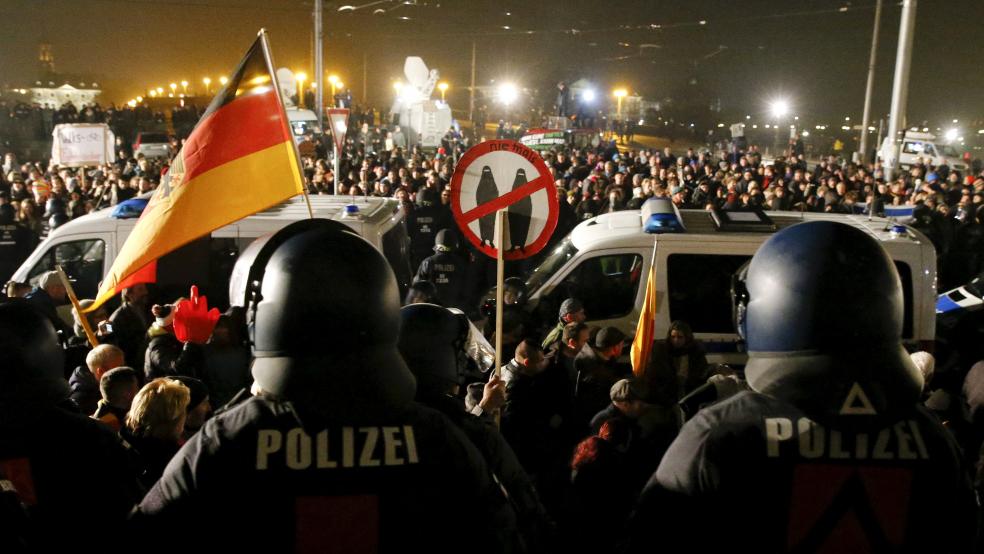The dramatic and tragic images of refugees pouring into Europe from the Middle East represent more than a temporary migration of people seeking asylum from persecution. We are witnessing the onset of a massive exodus of humanity provoked by civil wars in Syria, Iraq, Libya and Yemen, escalating insurgencies in Egypt and Afganistan, and the rise of ISIS and al-Qaeda.
This great migration will change the face of Europe, and as moderate Muslims seek safe refuge from hideous acts of terror and war, radical Islam will gain territory, wealth and influence in the Middle East. Can the terrorists be stopped?
Afganistan: The Resurgence of the Taliban and the Growth of ISIS
A U.N. report issued last month showed that ISIS has gained a foothold in Afghanistan, despite U.S. efforts to limit the power of the Taliban and the spread of ISIS, which has strongholds in 25 Afghan provinces. Afghan officials told the U.N.'s al-Qaeda monitoring team that 10 percent of Taliban insurgents are ISIS sympathizers. President Obama reversed his decision to pull out of Afghanistan this year and has decided to leave nearly 10,000 troops in the area through 2016 and about half that through 2017. To date, the US has lost 2,360 service men and women in Afghanistan.
Recently, ISIS launched coordinated attacks on about a dozen Afghan police checkpoints in the eastern part of the troubled country. The death of Taliban leader Mulla Mohammed Omar and the divide among the Taliban leadership over who should succeed him was used by ISIS to recruit new fighters. Despite these losses to ISIS, the Taliban has not taken a backseat. In late September, the terror group launched one of its largest attacks since the U.S. war began in 2001, capturing the provincial capital Kunduz. The governor‘s office, the police headquarters and the main prison were all captured, releasing hundreds of prisoners and detainees. It was the first time a provincial capital was lost since 2001. After a fierce battle, Afghan security forces retook Kunduz. This month, the Taliban launched large attacks on two other provincial capitals, Maymana in the north and Ghazni in the east.
Iraq: A Broken State on the Edge of Bankruptcy
After twelve years of public corruption leading to $550 billion of Iraqi oil money spent irresponsibly between 2006 and 2014, Iraq is on the edge of bankruptcy. Three vice presidents, three deputy prime ministers, twelve ministers, many hundreds of advisors, deputy ministers, ambassadors, general managers army and police generals and colonels were fired. About 14,000 army soldiers who were supposedly assigned to guard senior officials were sent to the Defense Ministry to fight against ISIS.
It’s a start, but not enough to return the country to solvency. Iraq still has more than 700 deputy ministers, 6,000 general managers and nearly three million civil servants. The government has just announced salary cuts that weren’t received well by Iraqis. One third of the Shiite militia fighters, Iraq's most motivated fighting force against ISIS, were not paid for months. With little discipline and oversight, some of them run loose in the Iraqi streets, kidnapping people for ransom or for sectarian revenge. As am example, sixteen Turkish workers were kidnapped in Baghdad last month and later released.
Just this week, Iraqi Prime Minister Haider al-Abadi complained about the dire fiscal situation in the country. Speaking on national TV, he said: "We make 59 trillion Iraqi dinars from exporting oil. When we take the cost of exportation out, that leaves us with 45 trillion. When we take the cost of serving the debts, we have 40 trillion left. The state employees' salaries and pensions cost us 50 trillion. How do we spend on war, health, education, agriculture, services, poverty and others?"
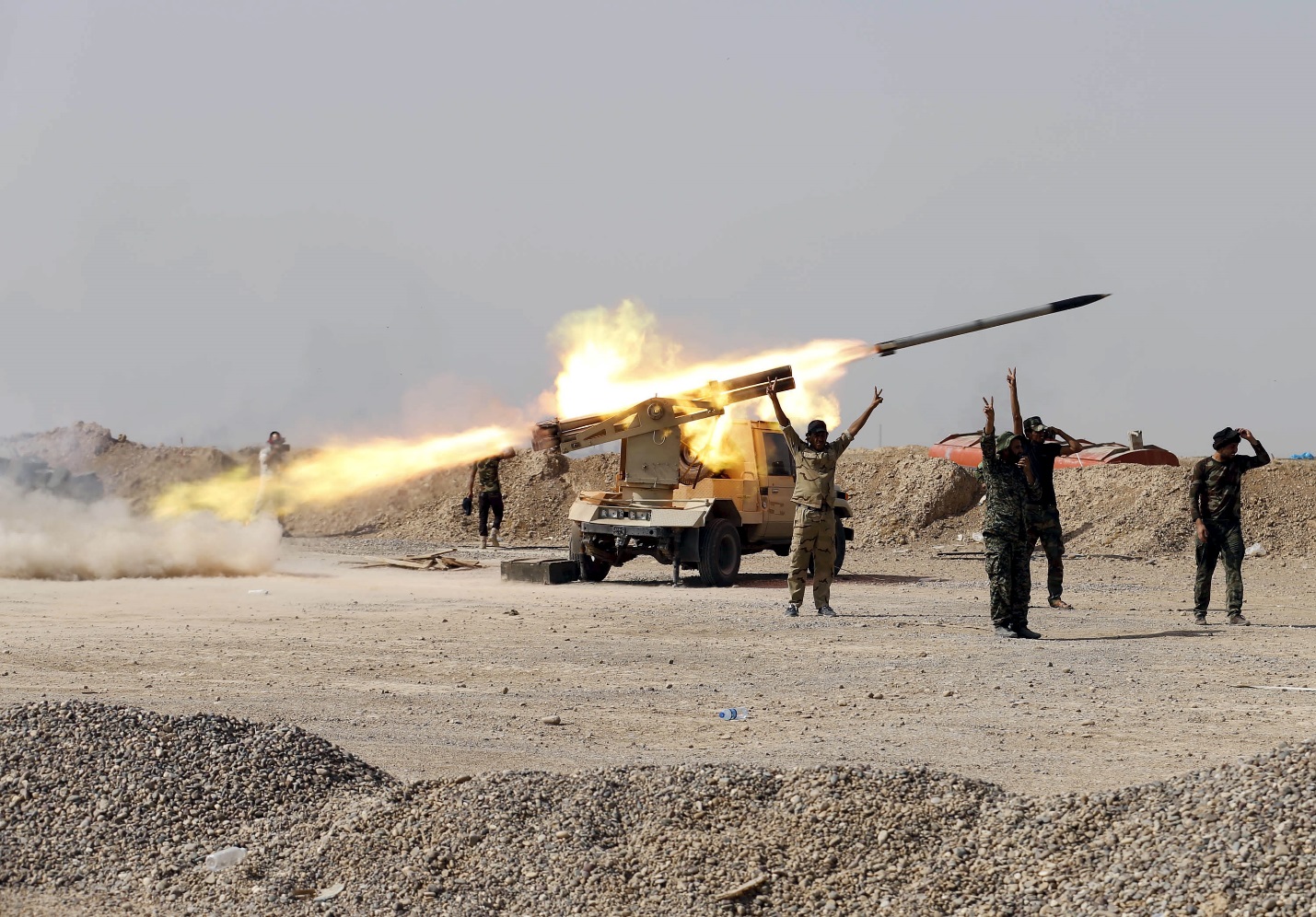
Shi'ite fighters fire a rocket toward Islamic State militants in Baiji, Iraq, October 16, 2015. REUTERS/Thaier Al-Sudani
Syria: The Russia Connection
Russian air raids against various Syrian rebel groups are an effort to tip the Syrian conflict in favor of Putin’s ally, dictator Bashar al-Assad. The consequences of Russia's move into the Syrian quagmire could match that of its disastrous intervention in Afghanistan thirty-five years ago -- the very conflict that gave birth to al-Qaeda.
Russia aims to avoid losing another dictatorial ally after it lost Saddam Hussein in Iraq and Muammar Gaddafi in Libya. Russia and Syria have been allies since the 1950s. For several decades, Russia has used a small military base on Syria's Mediterranean coast.
“There is a larger and more immediate goal — to bolster Syria’s Bashar al-Assad, a key Russian ally, by attacking U.S. and Arab-backed rebels as well as ISIS. Joining the war in Syria gives Moscow a military foothold in the Middle East and protects its access to a deep-water port in the Mediterranean. It also gives him the opportunity to flex his muscles for the entire world to see," writes Ian Bremmer, president of Eurasia Group, a political risk consultancy.
The Islamic world was already saddened and enraged over the Syrian tragedy. With Russia's bombing of the Sunni Syrian rebels, the rage will deepen.
Russia's army in the past -- from Afghanistan to Ukraine through Chechnya and Georgia -- depended on Soviet-era arms with “stupid bomb” technology and conscripted soldiers. Under Putin, Russia has upped its game with state-of-the-art technology and what some believe is a first-rate military. Still, while the U.S. and its Western allies try to avoid harming innocent civilians in military operations, Russia is less concerned about collateral damage.
Russia's involvement has been used already by al-Qaeda and ISIS propagandists to recruit new members. ISIS captured a military base from Syrian rebels, 10 miles north of Aleppo, Syria's largest city, when Russian air attacks hit that area. Meanwhile, the Syrian army launched an attack in eastern Aleppo that forced more than 70,000 people out of their homes.
Russia's direct military involvement in Syria will likely awaken old bitter enmity among Muslims. For centuries, the Russians and the Ottoman Turks struggled to control European regions of a weak Ottoman Empire. Russia used the issue of Christian minorities as an excuse to reach warm Mediterranean ports.
The Islamic world – about 85 percent of whom are Sunnis -- was already saddened and enraged over the Syrian tragedy. With Russia's bombing of the Sunni Syrian rebels, the rage will deepen. “Thirty-six years ago, the communist Soviet Union invaded Muslim Afghanistan to support the communist party and protect it from downfall. Here, its heiress, the Orthodox crusader Russia invades Muslim Syria to support the Alawites regime and to protect it from downfall. It should consider the fate of its ancestor,” declared a joint statement by 55 Saudi clerics calling for the Syrian rebels to unite against the Russians.
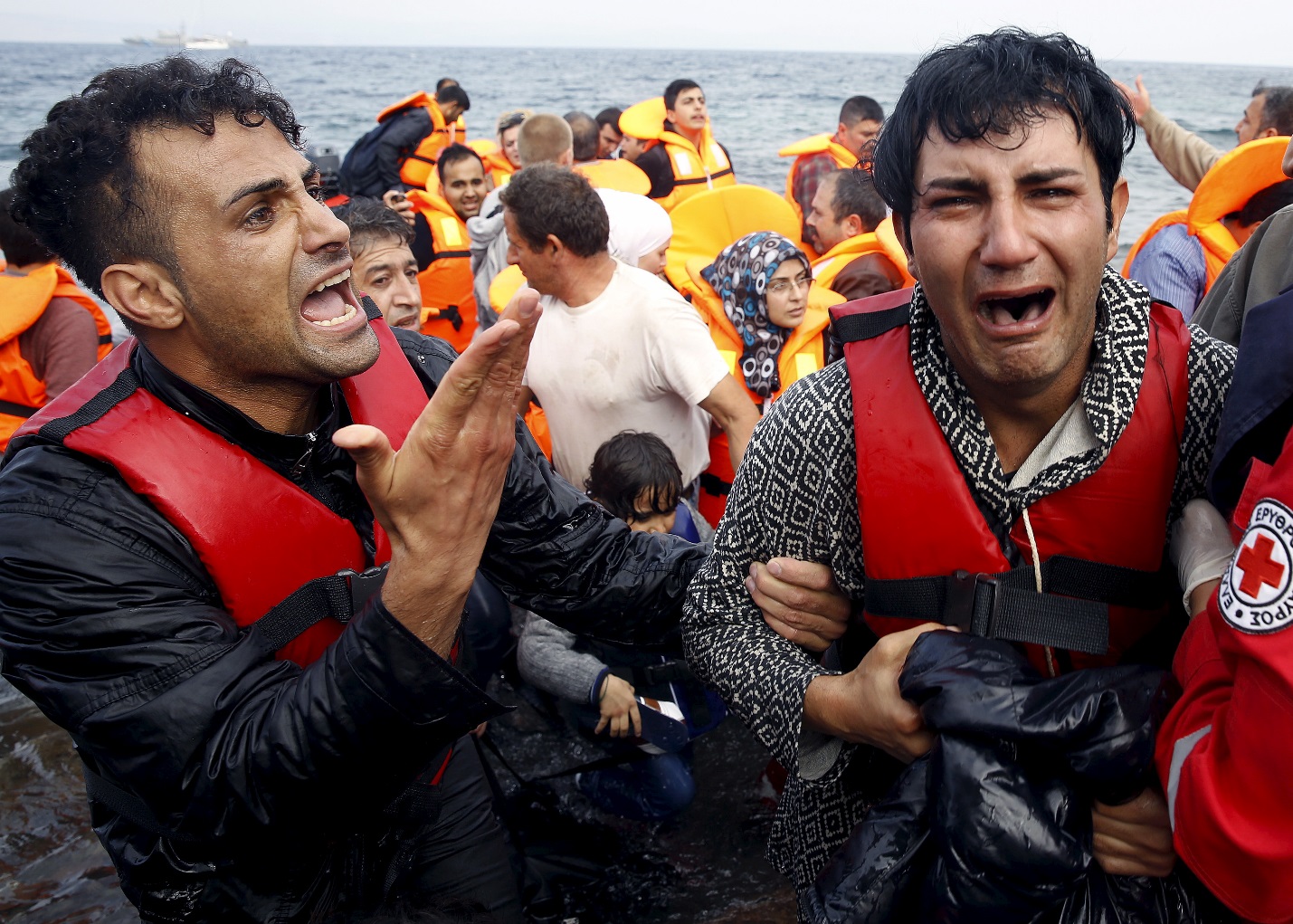 A Greek Red Cross volunteer comforts a crying Syrian refugee moments after disembarking from a flooded raft at a beach on the Greek island of Lesbos after crossing a part of the Aegean Sea from the Turkish coast by an overcrowded raft October 20, 2015. REUTERS/Yannis Behraki
A Greek Red Cross volunteer comforts a crying Syrian refugee moments after disembarking from a flooded raft at a beach on the Greek island of Lesbos after crossing a part of the Aegean Sea from the Turkish coast by an overcrowded raft October 20, 2015. REUTERS/Yannis Behraki
Yemen: Al-Qaeda Expands
In September 2014, the Shiite Houthi rebels seized Sanaa, the capital of Yemen. Shiites, about 40 percent of the population, lived with Yemen's Sunnis with little sectarian strife for centuries. But the weak Yemeni government encouraged the Houthis' lust for power. In January 2015, the Houthis took control of the government offices in the capital. The democratically elected president who was forced to flee asked Saudi Arabia for help.
Last March, Saudi Arabia and other Arab nations started an air campaign against the Houthis. In July 2015, the Yemeni government forces backed by Saudi and other Arab nations' special forces captured Aden, Yemen's second largest city.
As Yemen descended into civil and regional war, ISIS moved in to challenge al-Qaeda as the leader of radical Islam in the area and established yet another base of operation in the Middle East. In April, al-Qaeda militants gained control of al-Mukalla, Yemen's fifth largest city, on the Arabian Sea. The terrorist organization continued to expand its area in Yemen from the Saudi borders in the north to the Indian Ocean in the south.
ISIS used suicide attackers to target both the Houthis’ religious gatherings In Sanaa and government officials in Aden, claiming hundreds of casualties. Two weeks ago, al-Qaeda controlled another provincial capital, the port of Zanzibar on the Indian Ocean. Al-Qaeda's militants appeared recently in several parts of Aden as well.
The Yemeni civil war and Saudi-led air campaign has left more than 2,300 civilians dead, including about 500 children. As government forces approach the capital and head north to the Houthis' strongholds, they will likely face increasing resistance, which will give both al-Qaeda and ISIS another chance to expand. Al-Qaeda in the Arabian Peninsula (AQAP), which is the official title of the terror group’s joint Yemen and Saudi branches, is the strongest among the al-Qaeda network groups, with a record of attacks and attempted attacks in the U.S. and in the West, including the Charlie Hebdo attack in France in January 2015.
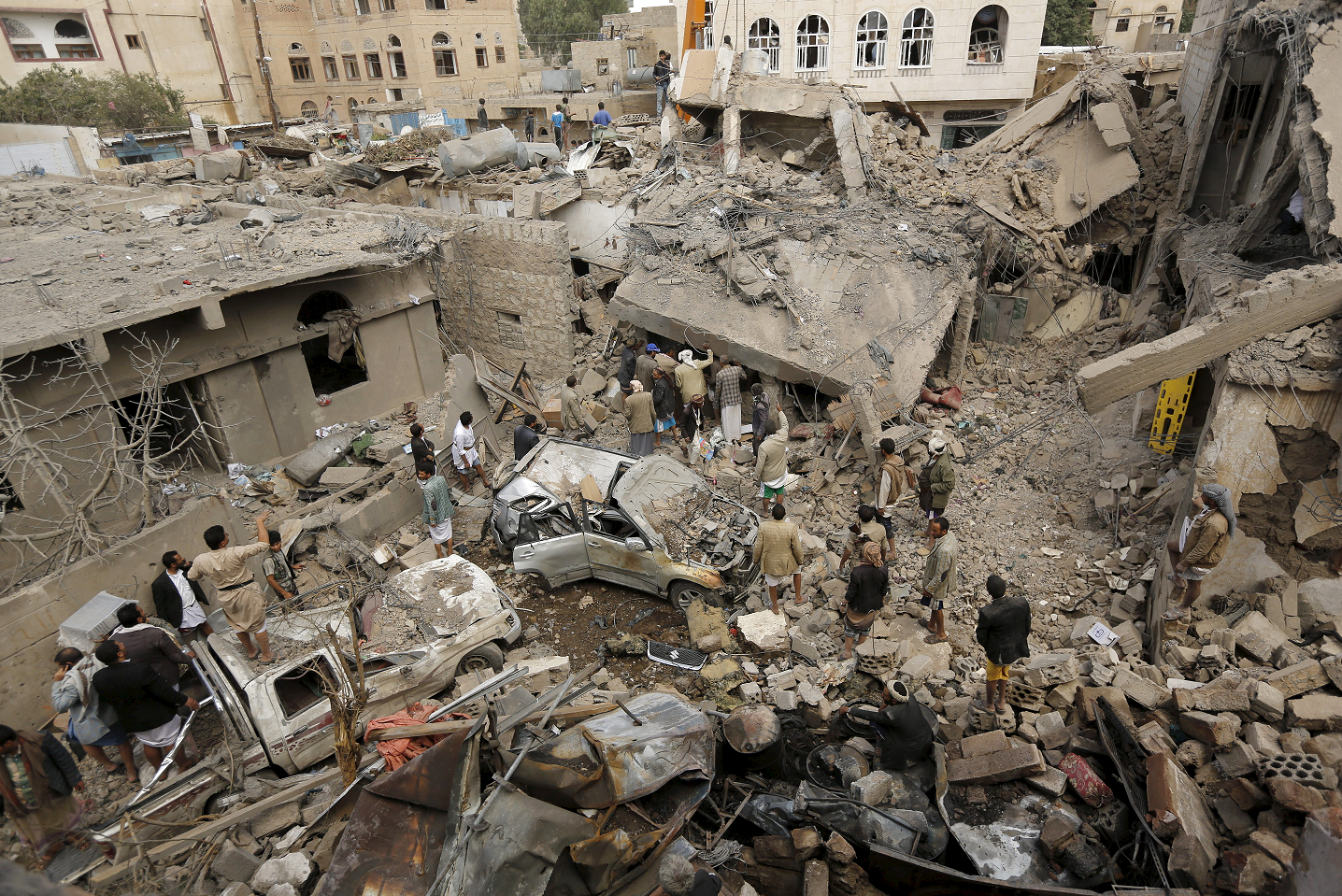 People gather at the site of a Saudi-led air strike in Yemen's capital Sanaa September 21, 2015. More than 4,500 Yemeni have been killed since the Saudi-led alliance began military operations in March. REUTERS/Khaled Abdullah
People gather at the site of a Saudi-led air strike in Yemen's capital Sanaa September 21, 2015. More than 4,500 Yemeni have been killed since the Saudi-led alliance began military operations in March. REUTERS/Khaled Abdullah
Egypt: ISIS Exploits the Muslim Brotherhood's Agony
One of the most worrisome problems in the Middle East is the ongoing campaign to suppress the Muslim Brotherhood in Egypt. Since the military coup in July 2013, the group has been subjected to the harshest repression in the country’s modern history. The elected Egyptian president, a leader of the Muslim Brotherhood, along with tens of thousands of its members and supporters, were imprisoned. Thousands of others were killed in raids in the streets and hundreds were sentenced to death by military tribunals without proper due process. The group was banned and considered a terrorist organization. Its assets were confiscated and its media outlets were shut down. The campaign against the Muslim Brotherhood is part of an effort to demonize and radicalize the group. For more than a year, several leaders of the group found refuge in Qatar. They were later forced to leave after Egypt, Saudi Arabia and other Gulf States pressured Qatar to deport them.
Some of the exiles found refuge in Turkey, governed by Recep Tayyip Erdoğan, an Islamist politician. The Brotherhood’s media outlets followed, but were not welcomed. Erdogan’s government shut down three TV channels in August 2015, partly due to the channels’ lack of funding.
With tens of thousands of its leaders, members, supporters and media chased from country to country and silenced, the Brotherhood is at a dangerous turning point that could result in new levels of violence in Egypt and the region.
Skilled in exploiting crises, ISIS jumped into the evolving Egyptian scene. In November 2014, a Sinai-based insurgent group joined ISIS and formed ISIS' Sinai state. Ever since, violence has escalated in Egypt, becoming a daily occurrence. Spectacular coordinated attacks have been launched against the Egyptian army, claiming dozens of soldiers each time. In late June 2015, Egypt’s Attorney General was assassinated in a car bomb in Cairo. A few days later, ISIS briefly seized control of the city of Sheikh Zuweid in Sinai when 70 of its militants attacked the Egyptian army there.
The Muslim Brotherhood witnessed a divide in its leadership between those in prison and those in exile. With some exceptions, the faction in exile wants to repel the attacks that the Egyptian state has made against them. The others are calling for a conciliatory approach toward the government.
Considering this, ISIS expanded its operations throughout Egypt, announcing new states in Cairo, the rural parts of Egypt, and in the western desert on the borders with Libya. Finally, in July 2015, ISIS asked the Muslim Brotherhood to join its Cairo state. “This is the right time for the Brotherhood to join the Islamic State. They must dissolve their group and contribute to the State – ISIS’s maneuvers ... carrying arms, starting the real armed Jihad, not demonstrations, is the only solution to topple the current regime,” says Abu Mohammed al-Jizawi, an Egyptian leader in an ISIS propaganda video.
The current indifference by most Egyptians towards the parliamentary election is a reflection of Egyptians’ loss of faith in democracy. The mere possibility of an allegiance between the Muslim Brotherhood and ISIS is disastrous. It could be ISIS's greatest win ever. The Muslim Brotherhood is the largest and oldest Islamic Party in the Middle East. It is also the mother organization of most of the Islamic movements in the region.
Ayman al-Zawahiri, the current leader of al-Qaeda, Abu Bakr al-Baghdadi, the current leader of ISIS, and Abu Ayoub al-Masri, ISIS’s former leader, were all members or supporters of the Brotherhood before being radicalized. The Brotherhood has ruled Sudan for almost two decades, the Gaza Strip for about a decade – via its Palestinian branch Hamas -- and Egypt, Libya and Tunisia briefly after the Arab Spring. It also has strong branches in Syria, Jordan, Yemen and Iraq. The Egyptian branch is the oldest and the largest with 100,000 to 500,000 members and millions of supporters. Tens of millions of Egyptians voted for the group's candidates in the presidential and parliamentary elections that the group won in 2012.
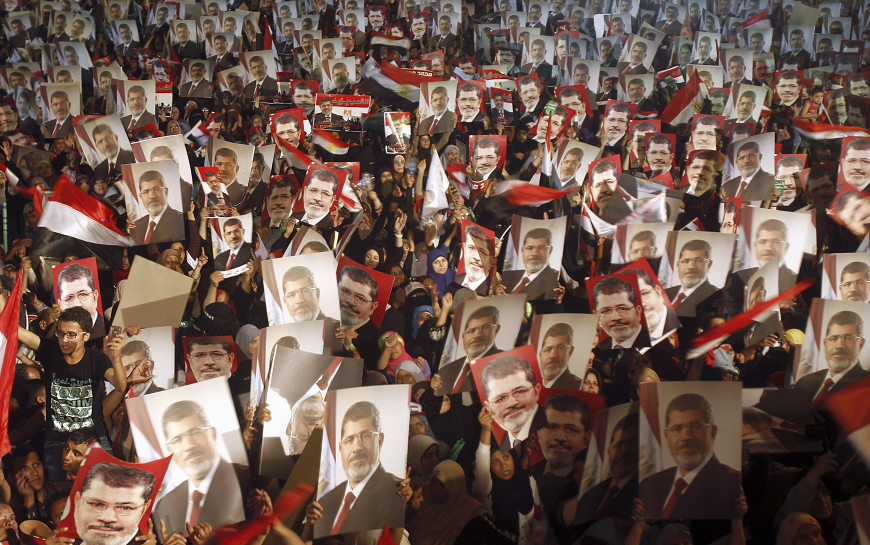 Members of the Muslim Brotherhood and supporters of Egypt's President Mohamed Mursi hold pictures of him as they react after the Egyptian army's statement was read out on state TV. REUTERS/Khaled Abdullah
Members of the Muslim Brotherhood and supporters of Egypt's President Mohamed Mursi hold pictures of him as they react after the Egyptian army's statement was read out on state TV. REUTERS/Khaled Abdullah
Libya: ISIS expands
Since the parliamentary election in June 2014, Libya has been in a civil war between the secular government that won the election, based in the east of the country, and the Muslim Brotherhood’s outgoing government, which refused to hand over power and is based in the capital Tripoli in the west. Using that conflict and the power vacuum it created, ISIS established a third power base on the Mediterranean coast, making Libya the third largest ISIS operation after Syria and Iraq.
In October 2014, ISIS captured the provincial capital of Derna in eastern Libya. In February 2015, it captured Sirte, another provincial capital in the center of the country. Dozens of Christians from Egypt and other countries were beheaded on camera and Egypt launched air raids in February 2015 in retaliation.
Nevertheless, ISIS has expanded its presence, securing most of Ajdabiya, another provincial capital that connects the western and eastern parts of the country with the south. ISIS bombed the city gates, the court and the security headquarters and neutralized six of eight military units defending the city. ISIS is also targeting Benghazi, Libya's second largest city, where U.S. Ambassador J. Christopher Stevens and three other officials were killed in September 2012 by radical Islamists.
Libya's main oil fields and the remains of its arsenal of chemical weapons are located to the south of ISIS-controlled territory. Libya, with the longest Mediterranean coast after Italy, borders Egypt, Sudan, Chad, Niger, Algeria and Tunisia. Most of these countries suffer political instability and terrorist activities. With its oil wealth and large arsenal of conventional and non-conventional weapons, Libya could be the best thing that has ever happened to ISIS. Tunisia just repelled the third ISIS attack launched from Libya, while Egyptian ISIS members are mobilizing to infiltrate Egypt from its Libyan border.
In February 2015, ISIS documents revealed that the terror group planned to smuggle terrorists disguised as refugees from Libya to Italy and Europe through the Mediterranean by boats. It is also believed that ISIS used some of Libya's former arsenal of chemical weapons to attack the Iraqi Kurds. Turki al-Binali, one of ISIS's top religious leaders, is believed to have traveled from Syria to Libya to oversee ISIS's operations there.
The Refugee Crisis in the Middle East
While the refugee crisis has claimed headlines recently, the exodus has been ongoing for years -- 11.7 million Syrians were forced to leave their homes over the last four years of the Syrian civil war. This means more than half the population of Syria’s 22.85 million people have fled the country. Another 4.7 million refugees have relocated to neighboring Turkey, Lebanon, Jordan, the Kurdistan region in Iraq and other countries.
For years, Syria's neighbors have suffered an unimaginable refugee crisis. In Iraq, ISIS captured Fallujah in January 2014, Mosul and Tikrit in June 2014, and Ramadi in May 2015, forcing three million Iraqis to flee their homes. Some of them went to Turkey, Jordan and other parts of Iraq, including Kurdistan, making an already bad situation in these countries worse.
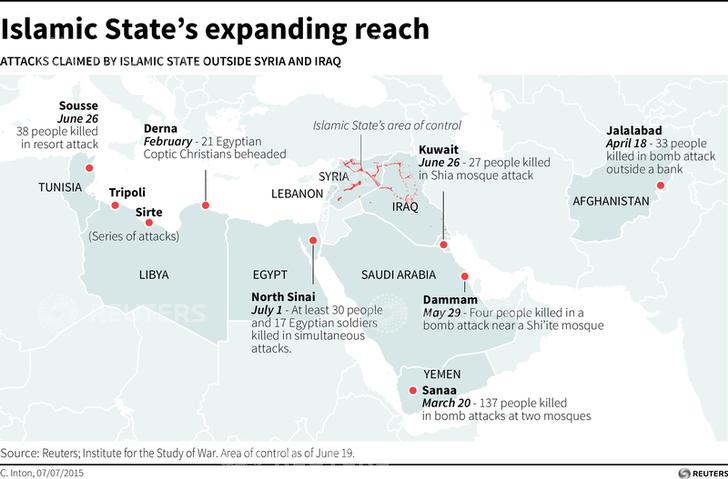
When the Libyan civil war broken out in June 2014, it forced about two million Libyans to seek refuge in neighboring Tunisia and 400,000 others in other parts of Libya. They now comprise 40 percent of the population of Libya and 20 percent of the population of Tunisia. Finally, when the Saudi-led military intervention in Yemen started in March 2015, nearly 1.5 million Yemenis were displaced.
A Demographic Earthquake
Both Turkey and Lebanon accepted about two million refugees each. Jordan and Kurdistan took in 1.5 million each. Lebanon, Jordan and Kurdistan each have populations of roughly six million, so the burden on these countries is immense. An economic and demographic earthquake is taking place. Some refugees are housed in tents within refugee camps; others are allowed to live in school buildings. Many others have rented apartments and houses, leading to a sharp rise in rents. The demand for food has created a similar rise in food prices. The refugees are also seeking health care, education, and other services while trying to find jobs in already troubled economies. As a result, unemployment is increasing throughout the Middle East.
The refugee crisis has also upset the region’s delicate sectarian and ethnic balance. Lebanon functions according to a power-sharing formula among Christians, Sunni Muslims and Shiite Muslims. Between 2011 and 2014, over two million refugees have poured into Lebanon. Most of them are Sunni Muslims from Syria. In practical terms, the well-armed Shiite militia Hezbollah has run the country for over a decade now. Hezbollah is struggling to control an area by the Syrian border four times the size of the capital Beirut where ISIS and al-Qaeda fighters are based. The two million Syrian Sunnis that have arrived are a direct threat to its reign. Lebanon is already in political and economic crisis. The country’s leaders failed to choose a president for the 30th time. The failed garbage collection system forced thousands to take to the streets to protest.
The flood of Arab Iraqi refugees has caused a surge in demand for housing, schools and health care, inflating prices.
When Lebanese citizens are forced to pay more for rent and food and compete with newcomers for jobs, it is hard to imagine that they would support pro-refugee policies. If refugees threaten civil peace in the country, the sentiment will only increase. The latest reports from the U.N. and the International Rescue Committee show a disturbing increase in “street children” in Lebanon who beg for money or worse. The more isolated they become, the more vulnerable they are to the seduction of ISIS.
Many of the refugees who went to Kurdistan were Arabs, with whom the Kurds are historically at odds. The flood of Arab Iraqi refugees has caused a surge in demand for housing, schools and health care, inflating prices. Meanwhile, Kurdistan is still suffering economically from a disagreement with Baghdad over sharing oil revenues. The delay in state employees’ salaries combined with the resistance of Kurdistan’s president to leave office at the end of two terms led to deadly street riots. The riots have deepened the political crisis.
In Jordan, a country already made up of nearly 70 percent Palestinian refugees, research has found that Syrian refugees took 40 percent of the new jobs in one province. In Turkey, several cities were flooded with Syrians that outnumbered the original cities' residents. A survey shows that 55 percent of Turks wanted their government to stop accepting refugees in January 2014, when the refugee population was only 700,000 people.
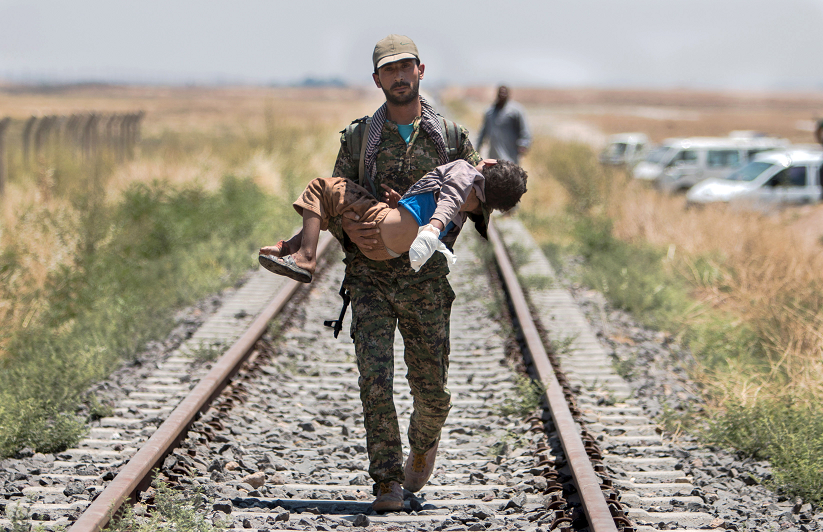 A Kurdish fighter carries a boy injured by what they said was a mine after they fled Maskana town in the Aleppo countryside and make their way towards the Turkish border. REUTERS/Rodi Said
A Kurdish fighter carries a boy injured by what they said was a mine after they fled Maskana town in the Aleppo countryside and make their way towards the Turkish border. REUTERS/Rodi Said
The Growing Refugee Crisis in Europe
For the past two years, thousands of refugees from the Middle East, Africa and South Asia have risked their lives in dangerous boat trips across the Mediterranean to Greece, Italy and Spain. More than 6,300 of them have died.
By last summer, Europe began to feel the crisis.
About one-third of the 710,000 illegal immigrants that have landed in Europe this year are Syrians. This number is much higher than the 282,000 immigrants that arrived in 2014. Afghans, Iraqis and others also entered Europe – with 220,000 headed to Germany. The European Union and Germany in particular are facing a situation that none of them is ready to face.
Unlike the United States, where immigration is a major part of the American success story, Europe does not have the long tradition of integration. While available social services could last for many years, immigrants and refugees often live in areas that host other refugees. True integration within a society is hard to achieve.
Since the European migration crisis started a few months ago, inter-European relations have been damaged. The landmark Schengen Agreement that created a border-less Europe now appears passé. Several European countries have built border structures to stop the flow of refugees. Others have closed their borders, forcing the refugees to change their routs to Germany and Sweden. "If we don't find a solution today, if we don't do everything we can today, then it is the end of the European Union as such," Slovenia Prime Minister Miro Cerar told reporters. Sixty-thousand refugees crossed Slovenia in the last few weeks.
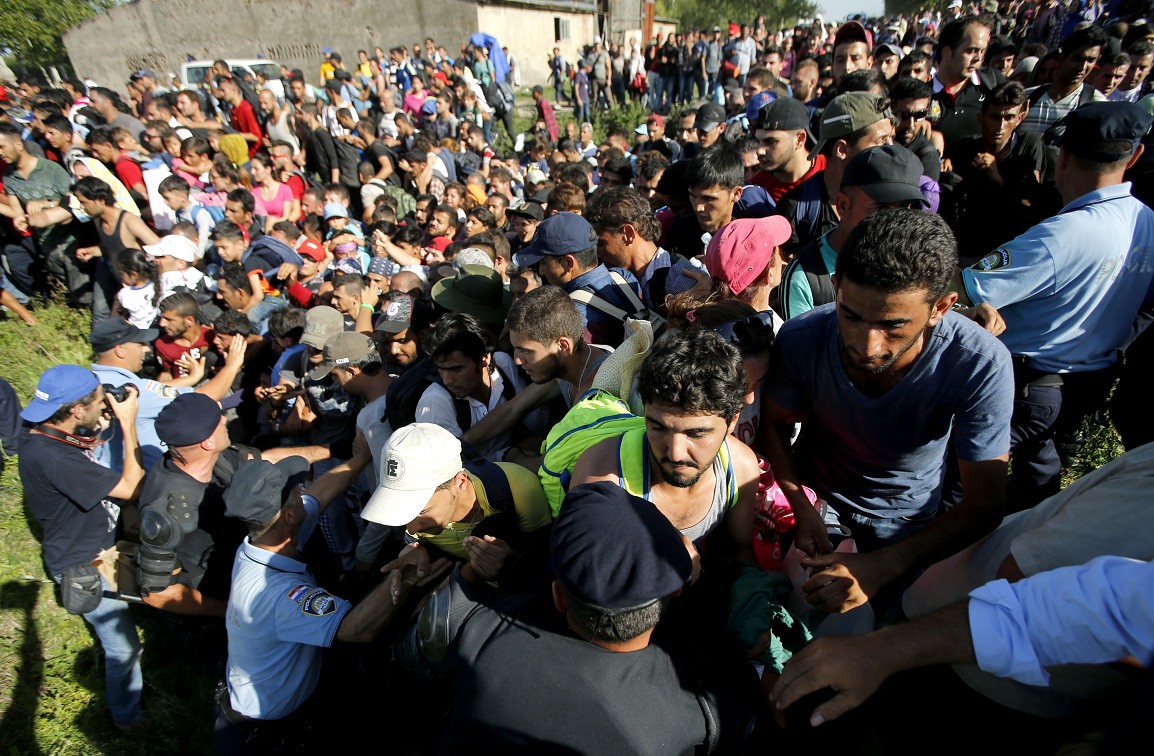 Migrants push police officers as they attempt to board buses in Tovarnik, Croatia. Croatia said on Thursday it could not take in any more migrants, amid chaotic scenes of riot police trying to control thousands who have streamed into the European Union country from Serbia. REUTERS/Antonio Bronic
Migrants push police officers as they attempt to board buses in Tovarnik, Croatia. Croatia said on Thursday it could not take in any more migrants, amid chaotic scenes of riot police trying to control thousands who have streamed into the European Union country from Serbia. REUTERS/Antonio Bronic
Major transportation lines like the Channel Tunnel between France and Britain and other train lines across Europe have been closed multiple times after being overrun by refugees. In Germany, some states have filed lawsuits against Chancellor Angela Merkel for violating the law by accepting illegal refugees. Polls show that 48 percent of Germans think that accepting refugees was a wrong decision, and Merkel’s popularity has dropped as a result.
Astonishingly, some of the refugees have been housed in former Nazi concentration camps in several parts of Germany. Xenophobia has increased, as many Germans fear the rise of Islam in their country. This year alone, 576 attacks have been reported against refugees in Germany -- a sharp increase from the 200 attacks reported in 2014.
With a population of about 80 million each, both Germany and Turkey are better economically equipped to cope with the influx of refugees than Lebanon, Jordan and Kurdistan. It is expected that the German economy will get a boost in the long run, but may have problems in the short term depending on how well the refugees are able to assimilate. One of the main issues is that many newcomers – close to half – will struggle in the short- and mid-term to find jobs. Language, education, and training are the main barriers. Unemployment is expected to increase slightly if we assume that the refugees will stop at the current level of 220,000.
But what if the current trend continues or worsens? In September, 170,000 illegal immigrants entered the E.U. What if the 710,000 immigrants so far in 2015 become 1.5 million by the end of the year, as many predict? The 170,000 refugees in September were a slight decrease from 190,000 in August. But this trend was reversed last week when 50,000 refugees entered Greece, breaking all past records. A slowing in the E.U.'s recovery from its worst unemployment crisis and weaker German economic growth could be the outcome of the migration crisis. Combined with the slowing Chinese economy, the European migration crisis could endanger the fragile recovery in the U.S. following the 2008 financial crisis.
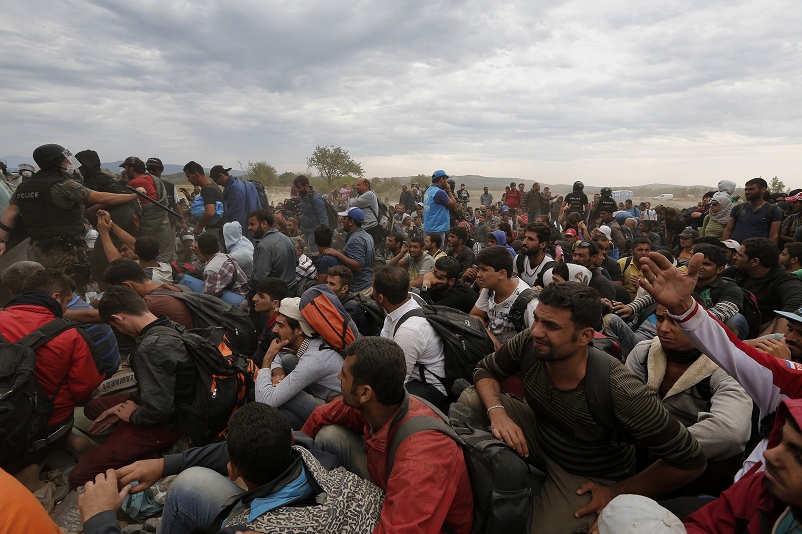 A Macedonian police officer tries to impose order as hundreds of refugees and migrants wait to cross Greece's border. REUTERS/Yannis Behrakis
A Macedonian police officer tries to impose order as hundreds of refugees and migrants wait to cross Greece's border. REUTERS/Yannis Behrakis
Conclusion
ISIS has become a terror hurricane, attracting tens of thousands of extremists across the globe, at the same time destroying the fabric of countries, societies and cultures. It has emerged as the most dangerous hub of intolerance and hate since the Nazis.
New data has shown that the U.S.-led campaign has failed to weaken ISIS, let alone crush it. As many as 30,000 foreign fighters joined the group, according to the CIA. ISIS is taking in about $50 million a month by selling oil, and has launched more than 1,000 attacks between June 1 and September 30, killing about 3,000 people around the world, according to HIS Jane’s Terrorism and Insurgency Center. This is a 40 percent increase from the previous three months. Finally, a report from a House taskforce on homeland security said that ISIS has inspired or directed 60 terror plots in the West, including in the U.S., according to a report by the House committee on homeland security.
The resurgence of ISIS and the Taliban in Afghanistan, the bankruptcy of the Iraqi government, the Russian direct military involvement in Syria, the rise of al-Qaeda amidst the continuous war in Yemen, the exploitation and ongoing suppression of the Muslim Brotherhood by ISIS in Egypt, and the expansion of ISIS amid the Libyan civil war are all parts of a lost Arab spring in the Middle East. This may be the darkest part of President Obama's foreign affairs record. These crises will be the inheritance of the next American president in January 2017.
And the Middle East is not the only part of the world that is experiencing increasing instability and driving refugees to Europe. Other hot spots include:
- The desperate situation in Somalia where ISIS issued four propaganda videos to urge the Shabab militia to switch alliance from al-Qaeda.
- Ongoing war in Darfur region in Sudan.
- Severe political repression in Eritrea and Gambia.
- War with Boko Haram, ISIS's African franchise in Nigeria where President Obama has sent 300 US soldiers.
- Poverty in Bangladesh amid the emergence of ISIS.
- The Taliban insurgency in Pakistan.
- Resumption of Turkey's war against the Kurdish rebels.
- The bad economic situation in Albania and Kosovo.
As moderate Muslims and other groups migrate to Europe, the Middle East loses the human capital --potentially talented men and, yes, women -- necessary to build modern economies and become part of a global society. Whatever the real goals of the Islamic State, one inevitable result of their actions, should they prevail, will be isolation.
Europe, already struggling to accept Muslims and other immigrants into their societies, will have an enormous challenge welcoming a new influx of Muslim refugees. According to recent reports, there is increasing conflict between citizens and newly arrived immigrants in Germany, the country of choice for many refugees.
Sweden has another problem. It’s one of the most generous countries in terms of its immigration policies offering cash and social services to all newcomers. But Sweden has also seen the rise of criminal gangs and more violent crime in ethnic areas. As a result, the country is becoming less tolerant racially. In a recent poll, 58 percent of Swedes believe there’s too much immigration. Ominously, 48 percent of immigrants don’t work. Maybe that’s why Denmark is discouraging new immigrants.
France and England have their own issues. The terror attack on the employees of Charlie Hebdo, which killed 12, exposed a fault line in France’s national security. Like Sweden, Britain has a rape problem that includes exploitation of children. And like Germany, there are Muslim areas where many crimes go unreported.
Europe has never truly integrated its immigrants. You’re French or you’re not; you’re British or you’re not, and so on. As a result, outsiders are marginalized, whether they’re guest workers in Germany or refugees in France. This new group immigrants could tip the balance on multiple levels—for jobs, for social welfare resources, for housing and food, and ultimately for safety.
If that happens, what is now just a small tear in the social fabric could rip Europe apart.

